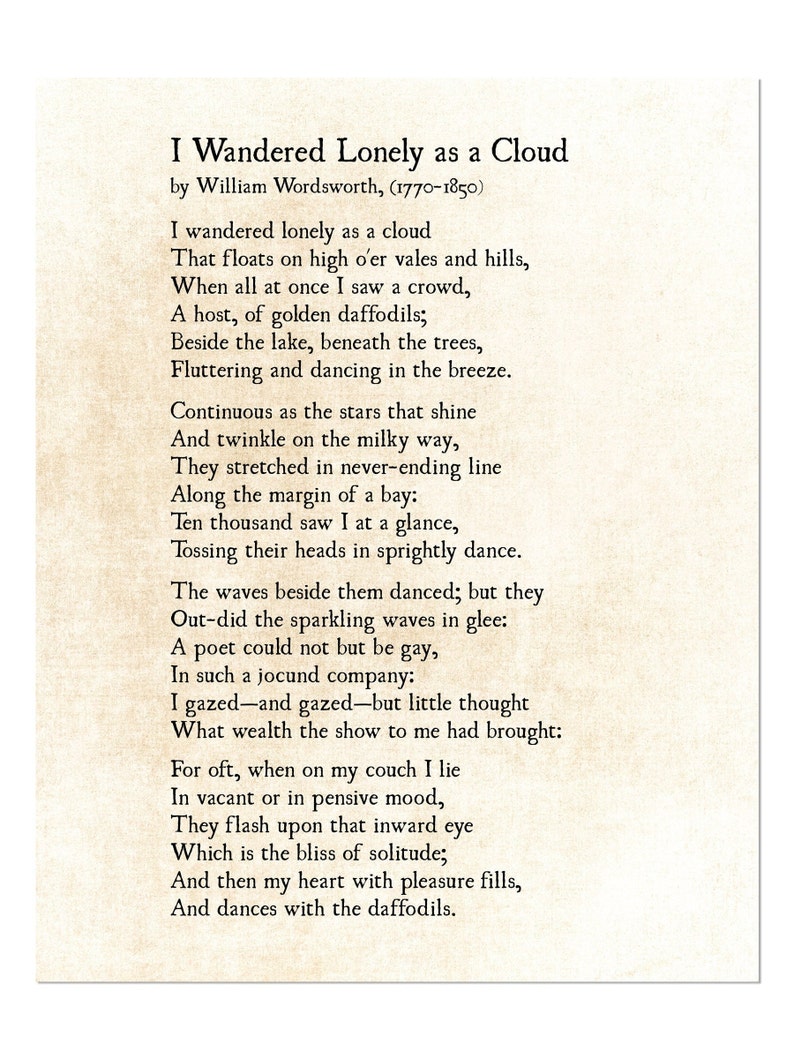
His sonnets stand with Shakespeare's and Milton's.Īs he grew older, he was to lose his powers, and he had premonitions of this, expressed in his Immortality Ode (1802-4) and most famously in his 1802 poem on the leech gatherer, Resolution and Independence:īut thereof come in the end despondency and madness

He had mastered his medium and wedded it to the strength of his feelings. Then, in 1812, the Wordsworths lost a little daughter and a son: his sonnet to Catherine, Surprised By Joy, composed some time after her death, is the most touching of elegies, the movement of the verse mirroring the movement of the body, heart and mind, the simplicity of diction shockingly enriched by the Latinate "vicissitude". The lonely precision of this strange cry of bereavement is heart-rending. Five years later, in 1804, he wrote The Affliction of Margaret, whose son is missing, perhaps dead: The sources of the imagination are not as clear and simple as Wordsworth often makes them seem. Were these poems connected with incestuous feelings for his sister, or with his apprehensions of the tragic risks of love, or with the early loss of his mother? Much has been written on this, little explained. The enigmatic Lucy poems (1799), inspired by a winter sojourn in Germany with Dorothy before he had a family of his own, foreshadow loss.

(Wordsworth loved the word under, as a prefix-adjective: it suggests to me his ever-present sense of the subconscious and the imminent, his ear tuned to music we can hardly hear.) He invested his hopes in family life and domesticity, in plain living and high thinking, with a tenderness towards his children inherited from the newly child-conscious theories of the enlightenment.īut children are hostages to fortune, and some of his finest poems pre-emptively record early death and the sorrow of losing a child. He liked to read with his wife and sister of an evening, and to listen to the kettle's "faint undersong". Wordsworth was perhaps the most sober of the great romantics, a water drinker, a walker of the hills, an exemplary family man who had put behind him (though he had not denied) a youthful indiscretion and an illegitimate daughter. It includes The Idiot Boy, a moving ballad treating its challenging subject (a mother's love for her "idiot" son sent out into the night to fetch the doctor for a sick neighbour) with the deepest respect and in the plainest language, and Tintern Abbey which records in higher language the intensity of the solitary poet's youthful response to a sublime landscape (his "aching joys" and "dizzy raptures") and his sense of a more "sober pleasure" associated with maturity, the presence of his beloved sister, and the power of re-creative memory and recollection. His first volume of poems, Lyrical Ballads, written in collaboration with Coleridge and published in 1798, stakes his territory: the plain, the rustic, the thoughtful, the everyday, the organic: a poetry in which "the passions of men are incorporated with the beautiful and permanent forms of nature". His is the third great iambic voice in the English language. Wordsworth revered both Shakespeare and Milton. The verse is powerful, supple, subtle, freely flowing. The story of his early life – his schooldays, his education at Cambridge, his wanderings in France, his response to the French revolution, his love of his sister Dorothy and his passionate friendship with Coleridge – are told in his great autobiographical work in blank verse, The Prelude, most of which written when he was in his 30s (only sections of it were published in his lifetime.) It is a work of astonishing originality, both in its subject matter (childhood and the growth of the mind, described with a pre-Freudian insight unprecedented in literature) and in its form.

#WILLIAM WORDSWORTH POEMS FREE#
He had a free and happy country childhood, and joy is one of his themes: through his vocation as a poet he transformed fear of mortality to intimations of immortality. His mother had loved him enough, and her love lasted beyond the grave. These early losses gave him an acute apprehension of mortality, but did not impair the flow of his affections. His mother died when he was only eight, his father five years later. His name is inextricably connected with the Lake District, where he was born in Cockermouth in 1770. We are his heirs, and we see and feel through him. W ordsworth changed forever the way we view the natural world and the inner world of feeling.


 0 kommentar(er)
0 kommentar(er)
